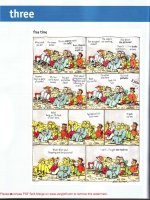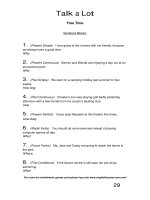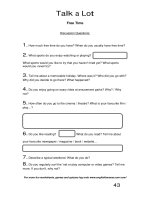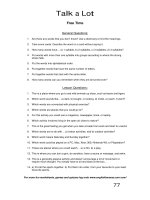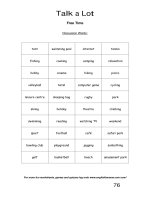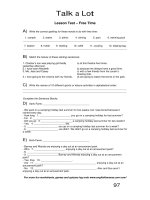mcc005 free time trends
Bạn đang xem bản rút gọn của tài liệu. Xem và tải ngay bản đầy đủ của tài liệu tại đây (203.51 KB, 2 trang )
MCC005
Multiple Choice Cloze
Read the text about how we spend out free time. Decide which of the four words best fits each space. Write
the correct word into the space provided.
Free time trends
(1) ___________________ people all over the world are
working longer hours. We also have more leisure time than
ever before.
After sleeping and working, watching TV is by far the most
(2) ___________________ leisure activity the world over.
The British watch more TV than any other nation in Europe,
but they read more too. The (3) ____________ majority,
eighty-five per cent, read newspapers, and 54% regularly
read books.
Two thirds of modern European women work full-time, but
they still do the main (4) _______________ of the housework
too. Husbands help in the household more than they did in former (5) _________. No wonder that
many working women say they are stressed and (6) ________________.
According to the latest (7) __________________ by supermarkets, the average British family spends
just 11 minutes preparing for the main evening meal. Almost half of all UK families in the UK eat
together only once a month or (8) __________________
More than half of young people in the UK have a fulltime job (9) ___________ the age of 19, but the
(10) ____________ of young Spanish and Italian people do not start full-time work until they are 24.
The average American fourteen year-old (11) _________________ only half an hour a day doing
homework, and less than a fifth of them participate in sports, music or have other hobbies. (12)
____________________, 65 % say they spend their time chatting on their mobiles and (13)
___________________ out with friends in shopping malls.
In the UK, pensioners are almost twice as active as teenagers, according to (14) ________________
research. People over 65 spend nearly two hours a day (15) ______________ physical activities such
as walking, cycling or gardening. However, surprisingly, people who use the Internet (16)
____________________ do more sport than people who never use it.
1
2
3
4
5
6
7
8
9
10
11
12
13
14
15
16
In general
joint
huge
cut
times
alert
inspections
fewer
with
majority
fills
In spite of
falling
recent
exercising
evenly
Although
common
massive
portion
ages
sleepy
examinations
less
up to
most
occupies
Nevertheless
hanging
newest
having
regularly
However
regular
wide
part
periods
exhausted
explorations
least
by
bulk
uses
Despite
running
latest
making
completely
Despite
general
vast
piece
dates
spent
research
smaller
under
mass
spends
Instead
dropping
last
doing
wholly
Read the text about how we spend out free time. Decide which of the four words best fits each space. Write
the correct word into the space provided.
Free time trends
(1) In general people all over the world are working longer
hours. We also have more leisure time than ever before.
After sleeping and working, watching TV is by far the most
(2) common leisure activity the world over. The British watch
more TV than any other nation in Europe, but they read more
too. The (3) vast majority, eighty-five per cent, read
newspapers, and 54% regularly read books.
Two thirds of modern European women work full-time, but
they still do the main (4) part of the housework too. Husbands
help in the household more than they did in former (5) times.
No wonder that many working women say they are stressed
and (6) exhausted.
According to the latest (7) research by supermarkets, the average British family spends just 11
minutes preparing for the main evening meal. Almost half of all UK families in the UK eat together only
once a month or (8) less.
More than half of young people in the UK have a fulltime job (9) by the age of 19, but the
(10) majority of young Spanish and Italian people do not start full-time work until they are 24.
The average American fourteen year-old (11) spends only half an hour a day doing homework, and
less than a fifth of them participate in sports, music or have other hobbies. (12) Nevertheless, 65 %
say they spend their time chatting on their mobiles and (13) hanging out with friends in shopping malls.
In the UK, pensioners are almost twice as active as teenagers, according to (14) recent research.
People over 65 spend nearly two hours a day (15) doing physical activities such as walking, cycling or
gardening. However, surprisingly, people who use the Internet (16) regularly do more sport than
people who never use it.
1
2
3
4
5
6
7
8
9
10
11
12
13
14
15
16
In general
joint
huge
cut
times
alert
inspections
fewer
with
majority
fills
In spite of
falling
recent
exercising
evenly
Although
common
massive
portion
ages
sleepy
examinations
less
up to
most
occupies
Nevertheless
hanging
newest
having
regularly
However
regular
wide
part
periods
exhausted
explorations
least
by
bulk
uses
Despite
running
latest
making
completely
Despite
general
vast
piece
dates
spent
research
smaller
under
mass
spends
Instead
dropping
last
doing
wholly
